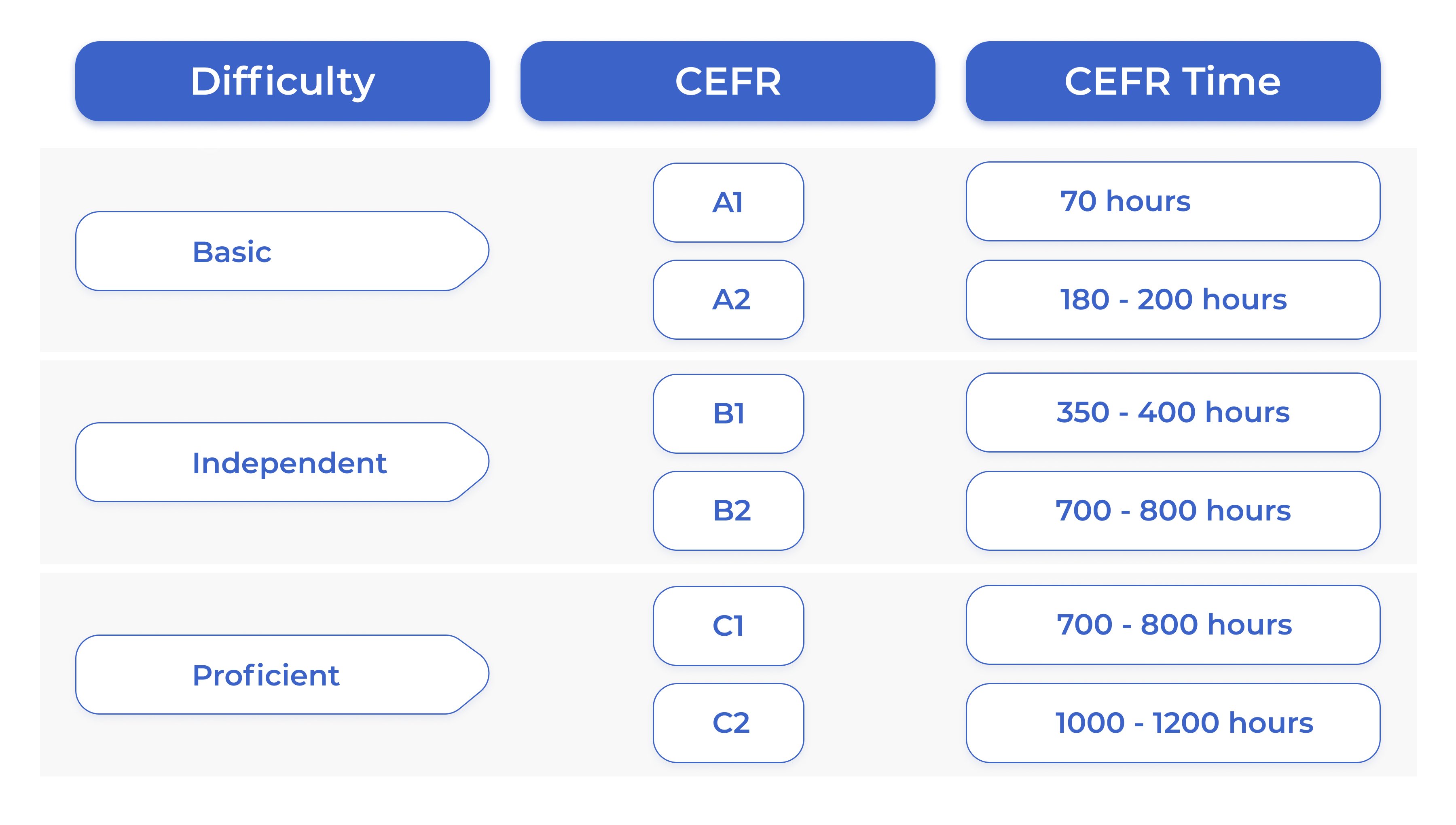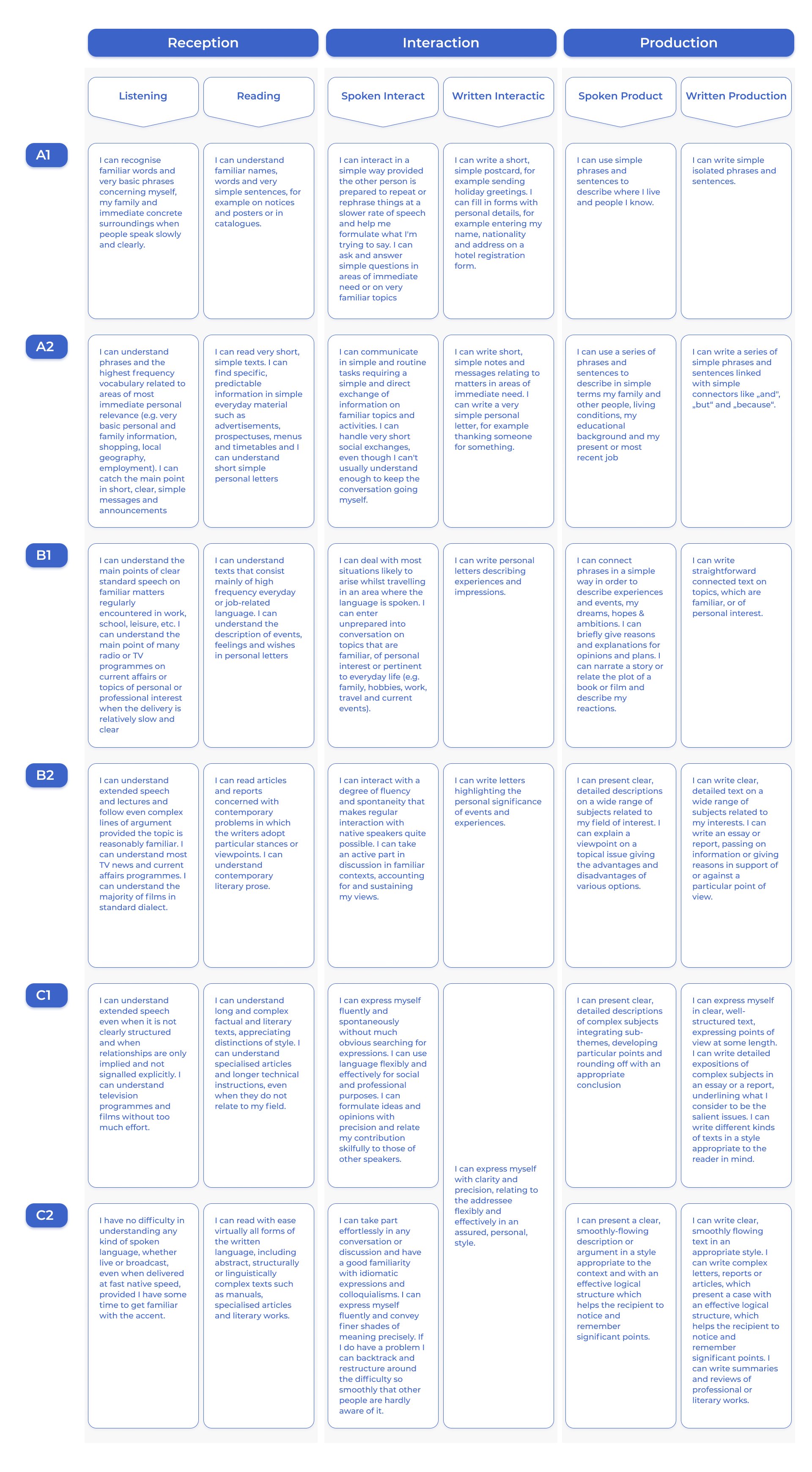English is an international language and there are a lot of reasons to learn it: global communication, traveling, career development and others. Students can begin their journey at Beginner level (A1 - A2) and finish at Advanced level (C1 - C2) if the goal is to learn English as a second language. They can stop at one of the levels when their goals or objectives are achieved. The amount of time that is needed for reaching the different stages depends on many factors, including the used materials, teaching methodology, motivation, quantity of free time and objectives of learning.
It is important to note that learning a language isn’t similar to walking on stairs. The distance from one to another level isn’t the same. It is more like climbing a mountain - the higher you are, the more difficult it is to go forward. Reaching B2 from B1 usually takes much more time than A2 from A1 because of a need to gain a larger range of language knowledge and competencies.
How many hours does it take to learn english?

Common Reference Levels - The Global Scale
Basic
CEFR A1
- Can understand and use familiar everyday expressions and the most basic phrases aimed at meeting the needs of a particular type.
- Can introduce him/herself and others and can ask and answer questions about personal details such as where he/she lives, people he/she knows and things he/she has.
- Can interact in a simple way provided the other person speaks slowly and clearly and is willing to help.
CEFR A2
- Can understand sentences and commonly used expressions related to areas of most immediate relevance (e.g. very basic personal and family information, shopping, local geography, employment).
- Can communicate in simple and routine tasks requiring a simple and direct exchange of information on familiar and routine matters.
- Can describe in simple terms aspects of his/her background, immediate environment and matters in areas of immediate issues.
Independent
CEFR B1
- Can understand the main points of clear standard input on familiar issues regularly encountered in work, school, leisure, etc.
- Can deal with most situations that can happen during travel in an area where the language is spoken.
- Can produce simple connected text on topics which are familiar or of personal interest.
- Can describe experiences and events, dreams, hopes and ambitions and briefly give reasons and explanations for opinions and plans.
CEFR B2
- Can understand the main ideas of complex text on specific and abstract topics, including technical discussions in his/her field of specialization.
- Can interact with a degree of fluency and spontaneity making regular interaction with native speakers quite possible without strain for either party.
- Can produce clear, detailed text on a wide range of subjects and explain a point of view on a topical issue giving the advantages and disadvantages of various options.
Proficient
CEFR C1
- Can understand a wide range of demanding, longer texts, and recognize and understand implicit meaning.
- Can freely and spontaneously express him/herself without much obvious searching for expressions.
- Can use language flexibly and effectively for social, academic and professional purposes.
- Can produce clear, well-structured, detailed text on complex topics, showing controlled use of organizational patterns, connectors and cohesive devices.
CEFR C2
- Can easily understand mostly everything heard or read.
- Can summarize information from various spoken and written sources, reconstructing arguments and messages in a consistent presentation.
- Can express him/herself spontaneously, very fluently and precisely, differentiating finer shades of meaning even in more complex situations.
Here you can find a self-assessment table which helps to understand your level:

To learn English faster
The acquisition of new skills requires systematic training. If you want to speak English fluently, it is usually recommended 2 academic hours 2-3 times a week. In order to learn English faster the specialists recommend to change the activities, for example:
- Pursue your interests
Improve your English skills with the things you really like. If you are a fan of art, go to the museum and choose audio accompaniment in English, read a magazine about art, watch a film about a great artist, or about the direction of art.
- Download an english learning app and try to use it everyday
Using the Langly app, you can practice reading, listening, and writing to build your vocabulary and grammar based on the academic course by Oxford University. This keeps you motivated in the learning process and you can always follow your friends' in-app progress. Whether you’re learning the language for personal reasons, traveling, school, university, career, family, or friends, you’ll love learning with Langly.
- Talk with real live humans
One of the best practical tips for learning English is communication with a native speaker; such contact is quite simple now. Once your level allows you to communicate with foreigners, it is better to start it immediately—such an experience will be more useful to you than communicating with the same language-speaking teacher because of the fact that the teacher will understand you since he/she speaks your language and it relaxes your brain.
- Subscribe to podcasts or Youtube channels (in English)
Podcasts—audio files in the style of radio on different subjects. Find the most interesting and listen to it on the way to work or to school. You also can watch YouTube podcasts of interesting English-speaking bloggers. Try to choose channels with useful content. At first it may be difficult to perceive native speakers' speech, but don’t stop! Soon you will begin to understand what you hear and increase your vocabulary.
- Go abroad in an English speaking country
If you have the opportunity, plan a trip to an English-speaking country. It is a good opportunity to gain useful experience and also to practice your knowledge. There is no doubt that such aspects as pronunciation, intonation, rhythm, and hearing skills would be improved during your stay in such environments.
You can even combine travel and language learning: there are special language camps abroad and volunteer programs where you can study English and combine it with childcare, nature, etc.
Langly can help to pass all the levels. The app is divided into stages and at the end of the level, the user can complete a quiz that shows the results and the degree of acquired knowledge.
If you want to become fluent in English, define the goals and move forward; you definitely will succeed!


